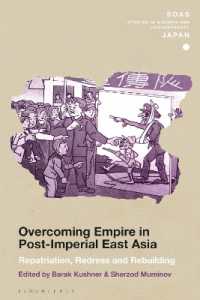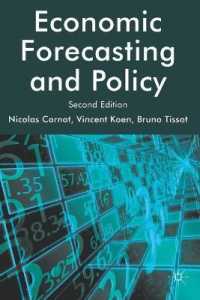- ホーム
- > 洋書
- > 英文書
- > Politics / International Relations
基本説明
Reviews the vicissitudes of U.S. policy toward South and North Korea since 1948. Using a careful analysis of declassified diplomatic documents, primary materials in English, Korean, Japanese, and Chinese.
Full Description
Political scientist Chae-Jin Lee reviews the vicissitudes of U.S. policy toward Korea-North and South-since the end of World War II, but especially since 1948 when rival regimes were installed in both North and South. Various American presidential administrations have sought to bring about stability and change in Korea, with varying degrees of success and failure. However, the U.S. could never effect better relations between North and South, despite overtures by Presidents George H. W. Bush and Bill Clinton. In U.S. Policy toward Korea, Chae-Jin Lee seeks to explain the continuously changing nature of U.S.-Korean relations by discussing the goals the U.S. has historically sought for Korea, they way in which these goals were articulated, both publicly and privately, and the methods and tools used to implement these goals. Lee makes it his task to not only write from the U.S. perspective, but to also cntruct the Korean points of view to the extent possible. The result is a book that reveals frustrations of all players-U.S. and the two Koreas-in attempting to arrive at some modicum of coexistence.
Contents
Acknowledgments
List of Abbreviations
Note on Korean, Chinese, and Japanese Terms
1. Introduction
2. The United States Faces Korea
First Encounters
Japanese Ascendancy in Korea
National Division
The Korean War
The Containment System
3. The Dynamics of Structural Adjustment: From Nixon to Carter
The Guam Doctrine
Nixon's China Policy
Ford's Interregnum
Carter's Military Policy
The Koreagate Investigations
Political Crisis in South Korea
4. The Passing of the Cold War: The Reagan and Bush Years
Reagan's Anti-Communist Policy
The Beijing Talks
Roh's Northern Diplomacy
Economic Relations
5. From Containment to Engagement: Clinton's Policy
Engagement Policy
The Four-Party Talks
The Perry Process
A Missed Opportunity
6. In Search of Hegemonic Diplomacy: Bush's Policy
Bush's New Doctrines
The "Axis of Evil"
The HEU Program
Multilateral Diplomacy
The Six-Party Talks
A Strained Alliance
The Yongsan Garrison
South Korean Troops in Iraq
7. Prospects
Continuity and Change
Inter-Korean Relations
The United States and Korea after Unification
Appendix: Tables
Notes
Index








